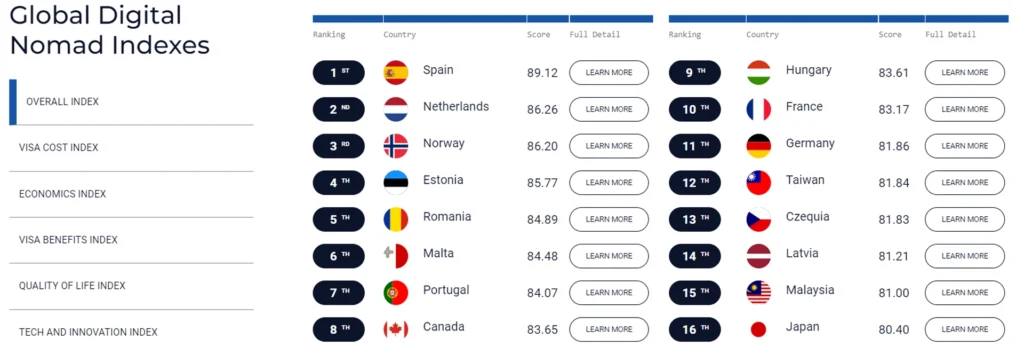The rise of digital nomadism is transforming global workforce and financial systems. According to Global Citizen Solutions, the number of digital nomads has skyrocketed from 10.9 million in 2020 to 35 million in 2024. Countries across the globe—including Spain, Japan, South Korea, Thailand, Portugal, Croatia, Estonia, and others—are rapidly introducing policies and infrastructure to attract these mobile professionals. These nations are positioning themselves as key hubs for the growing global remote workforce, recognizing the potential economic benefits digital nomads bring.

Source: Global Citizen Solutions
According to Global Citizen Solutions, Spain ranks as one of the top destinations for digital nomads in 2024 due to its strong digital infrastructure and the availability of long-term remote work visas. Spain, like many other countries, offers favorable conditions for remote professionals, such as coworking spaces and flexible living options, which contribute to its appeal as a nomad-friendly destination.
The Future of Work: Flexibility, Global Talent, and Challenges
As companies increasingly hire from a global talent pool, remote work is becoming the norm. However, managing distributed teams comes with its own set of challenges, particularly in ensuring compliance with varying local labor regulations and tax requirements.
Access to Global Talent
The ability to hire talent globally gives businesses access to a wider range of specialized workers. However, this also introduces complexity in navigating labor laws, payroll systems, and compliance regulations across different jurisdictions. Companies must be diligent in managing tax and legal compliance to avoid costly penalties.
Building a Remote Infrastructure
Remote work depends heavily on digital tools for communication and collaboration. Platforms like Slack, Zoom, and other project management tools have become essential. However, over-reliance on too many systems can result in inefficiencies and tool fatigue, where employees feel overwhelmed by the number of platforms they need to manage. Additionally, cybersecurity risks increase when handling sensitive data across distributed teams, making secure and integrated platforms critical.
Cultural and Leadership Shifts
Leading global, distributed teams requires a shift in leadership styles, moving from monitoring hours worked to focusing on results. Remote leadership must prioritize trust, transparency, and results-based performance management. Regular virtual team-building activities and check-ins are essential to maintaining engagement and cohesion across borders. Leaders must also navigate cultural differences, as communication styles and work habits vary across region.
The Future of Finance: Borderless Solutions for Digital Nomads
As digital nomads cross borders frequently, their financial needs are unique. Traditional financial systems must evolve to meet the requirements of this mobile workforce, particularly in handling multiple currencies, cross-border payments, and tax obligations.
Multi-Currency Accounts are becoming a crucial financial solution. Financial platforms are now offering multi-currency accounts that allow users to manage funds across different currencies with minimal fees. These services help digital nomads who earn in one currency and spend in another, simplifying cross-border transactions.
Blockchain and Decentralized Finance (DeFi) are also emerging as essential tools for digital nomads. DeFi platforms enable secure, borderless financial transactions without relying on traditional banks. These platforms allow digital nomads to manage assets, transfer funds globally, and even invest without the high costs and restrictions of traditional banking systems. As DeFi grows, digital nomads will increasingly leverage these technologies for greater financial independence.
Tax Compliance and Automation remain significant hurdles. Navigating tax obligations across multiple countries is complex, as nomads often face double taxation or unclear residency rules. Businesses must invest in automated payroll systems that handle compliance in different jurisdictions, ensuring that employees meet their tax obligations no matter where they are based.
Corporate and Government Responses to Digital Nomadism
Governments are recognizing the potential of digital nomads to boost local economies, and many are offering digital nomad visas. These visas allow remote workers to live and work in their countries for extended periods while contributing to the local economy.
Japan introduced a six-month Digital Nomad Visa in 2024, aimed at attracting skilled professionals who want to experience its tech-driven culture. South Korea launched a one-year workation visa, positioning itself as a hub for remote workers in fields such as AI and blockchain. Thailand has ramped up efforts to attract remote workers, promoting its digital nomad visa, with cities like Chiang Mai and Bangkok becoming popular destinations due to their low cost of living and strong digital infrastructure.
Corporate Strategies
For businesses, offering flexible work contracts and adopting remote-friendly policies is essential to attract top talent. Remote work is no longer just a perk but a necessary offering for staying competitive in a global market. Global payroll solutions, legal compliance support, and secure collaboration tools are crucial investments for companies managing a distributed workforce.
Long-Term Implications: A Borderless Future for Work and Finance
The rise of digital nomadism will have long-lasting impacts on both work and finance. As more countries and companies adjust to this new reality, the future of work will become increasingly decentralized, flexible, and globally connected.
Decentralization of Workforces will continue to shape how businesses operate. Remote-first and hybrid models will become the norm, with companies adopting new management styles that focus on results rather than hours worked. Companies that embrace these models early will gain access to a broader, more diverse talent pool, leading to increased innovation and productivity.
Fintech Innovation will also play a critical role in supporting a mobile workforce. Financial institutions must offer seamless cross-border services, with innovations in DeFi, multi-currency accounts, and tax compliance tools. The companies and platforms that adapt quickly to the needs of this demographic will have a significant advantage in the future.
Conclusion: Preparing for a Global, Borderless Workforce
Digital nomadism is not a temporary trend; it represents a fundamental shift in how work and finance operate. Governments and companies that embrace this movement are positioning themselves for success in a decentralized, global economy. By investing in flexible work models, secure digital infrastructure, and financial solutions tailored to the needs of a mobile workforce, businesses can remain competitive in this evolving landscape.
As the global economy continues to evolve, companies and institutions that adapt to these changes will thrive, while those that fail to adjust may struggle to keep pace with the rapidly transforming workforce.
Disclaimer:
The content provided in this article is for informational purposes only and does not constitute financial, legal, or investment advice. The insights shared are based on current information and analysis, and they do not necessarily reflect the official stance of the institution on these matters. Readers are encouraged to conduct their own research and consult with a professional advisor before making any financial decisions.






